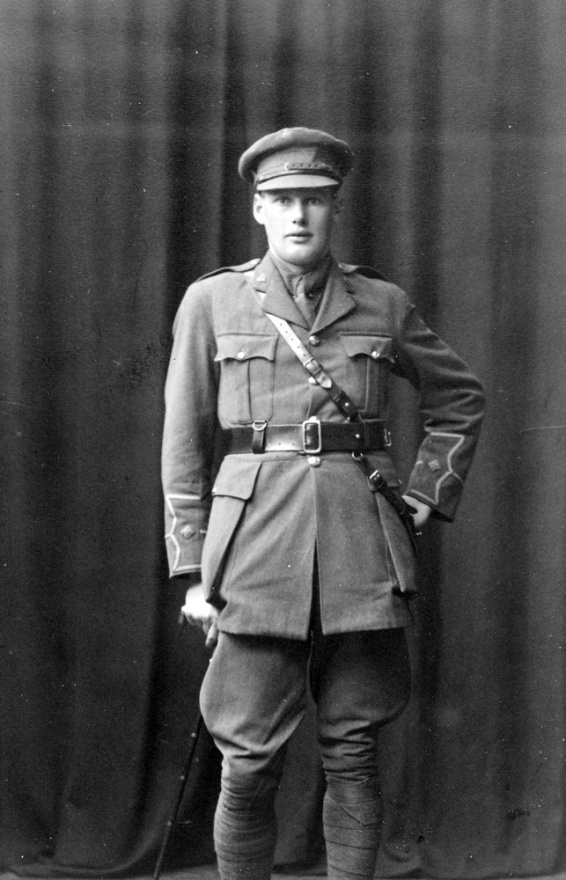
George Bollinger was born in New Plymouth on 10 April 1890. His father, Max, had migrated to New Zealand from Bavaria, southern Germany, in the 1880s and farmed near New Plymouth.
Bollinger volunteered for the New Zealand Expeditionary Force on 14 August 1914, nine days after the declaration of war. Within a month of his enlistment, the Defence Department received a complaint about his supposed German sympathies. A subsequent investigation found Bollinger to be of ‘very good’ character.
After leaving the country with the Main Body of the New Zealand Expeditionary Force in October 1914, Bollinger kept a detailed diary while on active service. His accounts, particularly of Gallipoli, document superbly the experiences and shifting attitudes of a New Zealand soldier during the campaign.
Following the withdrawal from Gallipoli, Bollinger returned to New Zealand for officer training. Promoted to second lieutenant in April 1916, he took up a post as an instructor at Trentham Camp, near Wellington. Publicity surrounding his promotion led to further insinuations by anti-German campaigners, but the army held firm. The Minister of Defence, James Allen, explained that Bollinger had been commissioned because of his ‘exceptional gallantry and faithful conduct … in the face of the enemy’.
To put the rumours to rest, Bollinger volunteered to return to active service – this time, to face the Germans on the Western Front. Wounded in action on 8 June 1917 during the Messines offensive, he died two days later and was buried in the Bailleul military cemetery. His brother Herman died of wounds in March 1918 while fighting with the New Zealand Division in the same sector. Eight of Bollinger’s cousins also died on the Western Front – fighting for Germany.
George Bollinger's diary
Sunday 25th April The day is beautifully fine. We are steaming full speed, close to the southern shores of Gallipoli. What a day of days! We left Lemnos at 6.00 am and continuously from 8.00 am we have moved amongst a roar of thunder. At present we are within a very few miles of our warships and transports, which are stationary here. What a sight! Their big guns never cease, and as we see the flash and burst of the shells on land, we think thousands of Turks must be going under. Has ever a bombardment like this taken place before? Our men are very calm, and some are even lying about reading and taking no notice of the bombardment. Boom, boom, boom. It never ceases. What batteries could reply to these 15 inch mouths of destruction.
Monday 26th April 3.15 am. 'Packs on' was roared out. Torpedo destroyers are alongside to take us ashore. 9.40 am. On shore in the thick of it. The first casualty in our company was in my section. Just before dawn we were on the destroyers waiting for surf boats to take us ashore. Stray bullets were landing around us and suddenly Private Tohill who was standing just in front of me dropped with a bullet through his shoulder. Immediately after, Private Swayne was shot in the forehead. It was a relief to get ashore. The Australians were frightfully cut about effecting a landing yesterday. They say there are at least 6000 casualties. They did heroic work and the whole world will know of it. We are in a gully immediately behind the firing line and will be called in to relieve at any moment. Two New Zealand battalions were in last night and got cut about. The Turks have overwhelming numbers and it is a perfect wonder how the Australians captured these heights. In landing as many as 49 were killed in one boat and a whole regiment was practically wiped out. The din and roar and whistle of the missiles is awful. As we sit here the ambulance are passing with wounded on the stretchers. 5.00 pm. We climbed heights to take our place in reserve, to firing line. We are right in the fire zone and saw some awful sights.
Tuesday 27th April At daylight this morning a terrific artillery duel raged. The Turks put hundreds of shells onto our landing place. At 10.00 am we were marched north along the beach, and as we got under heights we met crowds of wounded coming down. Oh how callous one gets. Word rushed down from above for Hawkes Bay and Wellington-West Coast Companies to reinforce at the double, as our fellows were getting massacred. We threw off packs and forgot everything in that climb up the cliffs. We fixed bayonets on reaching top and got into it. The country is terribly hilly and covered with scrub from four to five feet high. On we rushed against a rain of bullets and our men began to drop over, before they fired a shot. We started to get mixed and were everywhere amongst the Australians. Our men were dropping in hundreds.
Wednesday 28th April We were relieved about 8 o'clock. Mostly our nerves were gone. We retired back and tried to rest: our casualties were very heavy. We manned the trenches again at 6 o'clock. No sleep and nothing to eat, just a craving for drink, and the wounded always empty our bottles. The Turkish trenches are now on a ridge about 200 yards away. Our warships are shelling them, but unfortunately have also accounted for a number of our casualties.

Community contributions